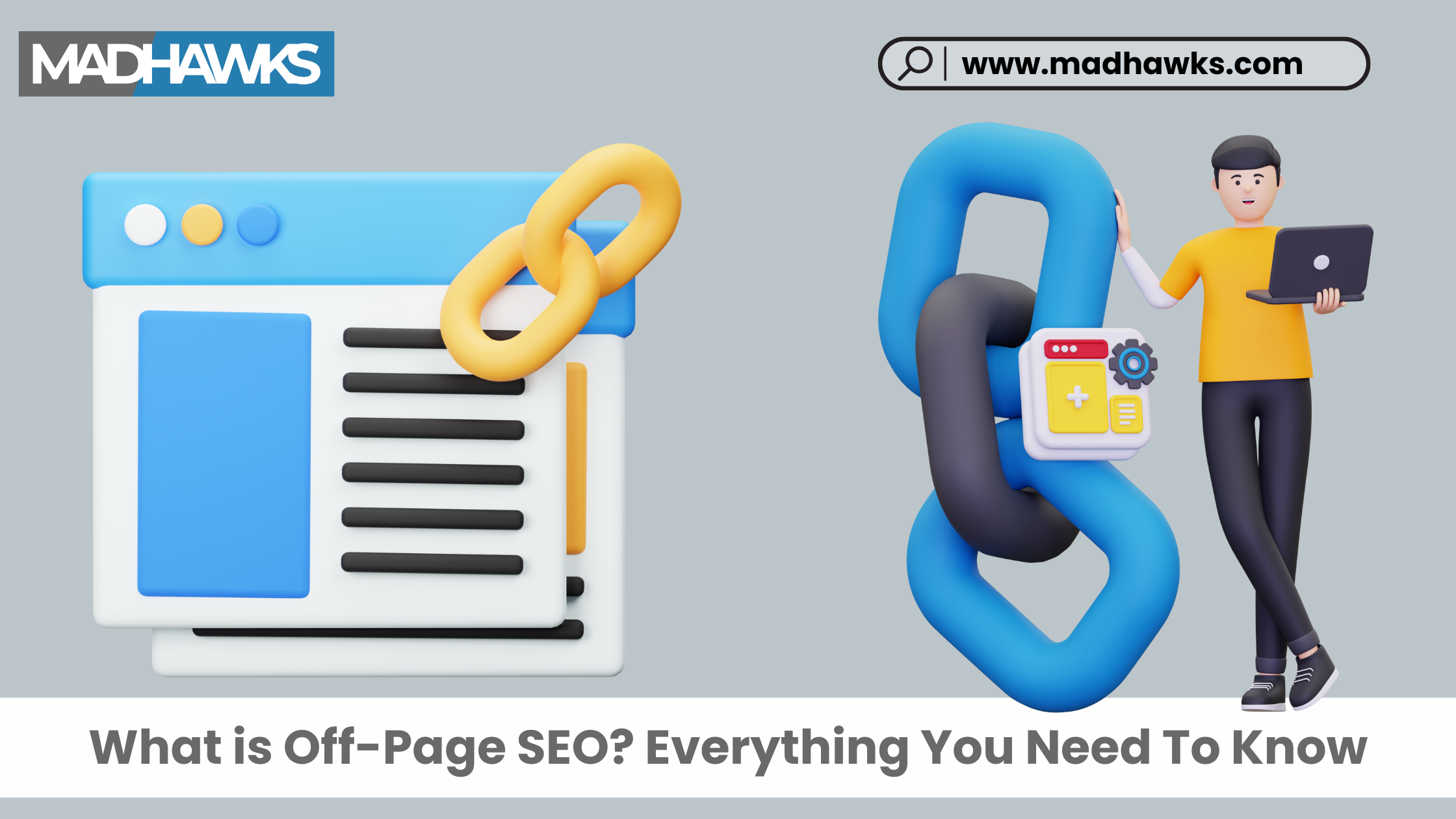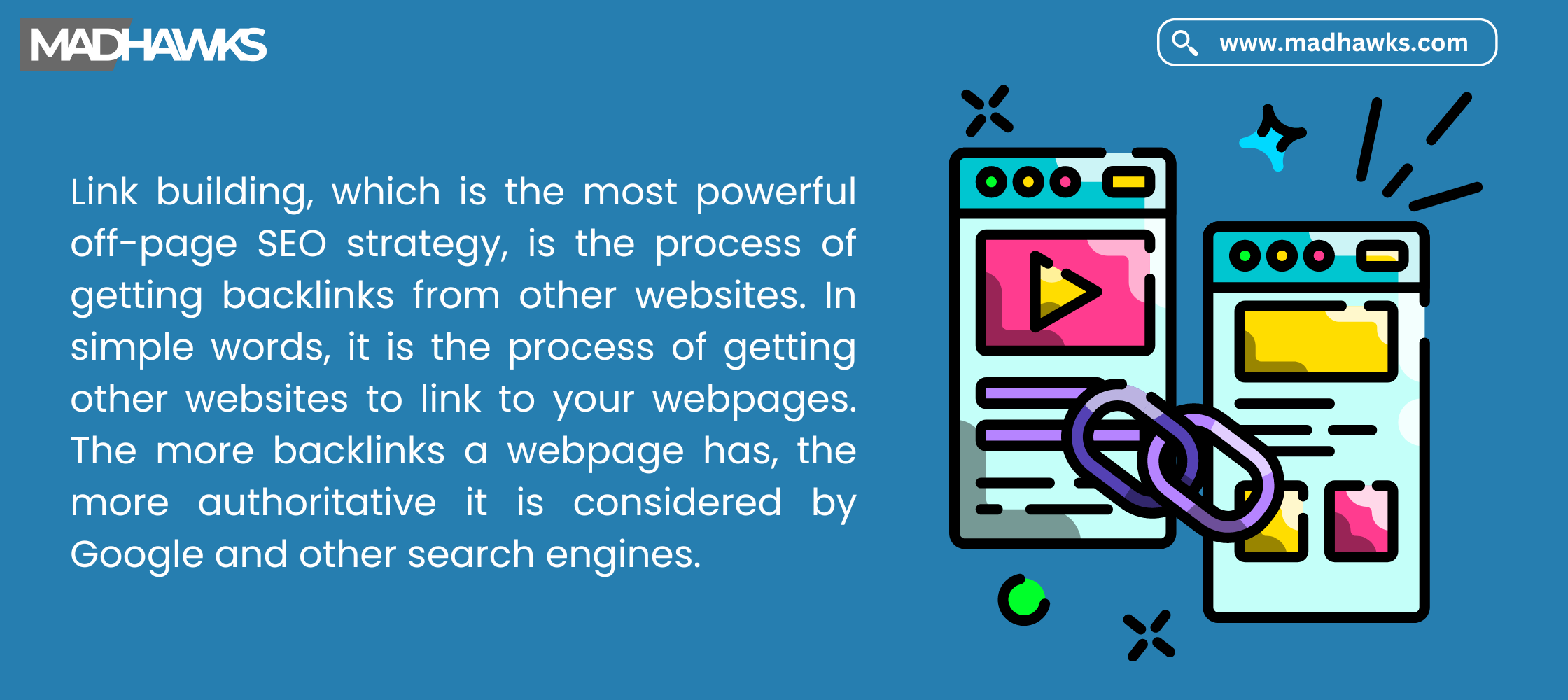What is Off-Page SEO? Everything You Need To Know
Posted By Gaurav | 01-Apr-2024 | Search Engine Optimization
SEO (Search Engine Optimization), which is one of the building blocks of digital marketing, is not just about what you do on your website. It’s much more than that. Even the efforts you make outside of your website are counted under SEO if they impact your website’s reputation, visibility, or rankings in any direct or indirect manner. These efforts are known as off-page SEO. Although on-page SEO is where you need to start, you can’t establish a powerful online presence without off-page strategies. Let us discuss Off-Page SEO in more detail and understand how you can build an effective off-page strategy:
What is Off-Page SEO?
Off-page SEO involves the efforts you make outside your website to improve its organic search rankings. In simple words, off-page SEO is the process of trying to improve your website’s search engine rankings without making any changes to the website itself. It can be done through various techniques. The major part of off-page SEO is link-building. Some people even understand link-building as off-page SEO. However, there are also some other strategies that contribute to improving a website’s off-page SEO, such as guest posting, customer reviews, social media marketing, local SEO, etc.
These promotional activities might not affect the search traffic in the short term, but they benefit the brands in the long term. These off-page activities help improve brand awareness, which is very important. No one will ever be aware that your brand exists if you don’t promote it. This is where off-page activities become extremely significant.
Why Off-Page SEO Matters?
As mentioned earlier, off-page SEO plays a crucial role in building brand awareness and establishing your website’s reputation. All the off-page SEO factors like recommendations, reviews, backlinks, etc, make search engines see your website as a reputable one.
Also, these off-page activities can contribute to the site’s rankings. A study conducted in 2020 found a direct correlation between the number of backlinks to a website and its Google search rankings. A site that doesn’t have enough backlinks from other websites is not considered worth crawling and indexing by search engines. Failure to attain backlinks can lead to a decrease in search traffic.
In order to build your website’s credibility, you need to focus on EEAT, which stands for Experience, Expertise, Authoritativeness, and Trustworthiness. It is a concept used by Google’s quality raters while evaluating search engine results. And the best way to attain authoritativeness and trustworthiness is off-page SEO. These quality rater guidelines of Google highly depend on the off-page reputation of a website while determining whether the site can be trusted or not.
Difference Between On-Page and Off-Page SEO
As we have already discussed, off-page SEO is all about efforts that take place outside of a website to improve the site’s search rankings. On the other hand, on-page SEO refers to tactics applied directly to web pages in order to improve the site’s rankings.
Although the end goal is the same with on-page and off-page SEO, there is a significant difference in how the two work. While on-page SEO focuses on website content, keywords, title tags, meta descriptions, internal linking, external linking, images, page speed, etc, off-page SEO emphasizes activities like link building, guest posting, reviews, public relations, brand mentions, etc.
Understanding Off-Page SEO Best Practices
Some of the best off-page SEO strategies are listed below along with the best practices you can follow to make your off-page SEO work:
1. Link Building

Link building, which is the most powerful off-page SEO strategy, is the process of getting backlinks from other websites. In simple words, it is the process of getting other websites to link to your webpages. The more backlinks a webpage has, the more authoritative it is considered by Google and other search engines.
However, these links should not be seen as spam links by Google. In such cases, these links can impact your site’s rankings negatively. Therefore, you must ensure that backlinks to your website come from authoritative domains. Although the quantity of backlinks matters, the quality matters even more.
If you are new to link building, you can start by finding and replicating your competitors’ best links or by writing guest blogs for authoritative websites in return for a link. Go for links that are easy to replicate and also of high quality. Before pursuing a link, you need to check for a few crucial things, including the relevance, authority, and placement of the link. To dive deeper into the process of link building, let us explore some popular tactics:
- Broken Link Building: This is an effective strategy that involves finding broken backlinks on relevant websites and requesting the site owner to replace the broken link with a link to your website. You can use backlink analytics tools to find such backlinks and inform the publishers that their links are not working. They will most likely replace the links, especially if your website content is relevant to their pages.
- Unlinked Brand Mentions: Not only links but even unlinked brand mentions can be used in off-page SEO. These mentions work as references to your website without links. You can try finding such unlinked mentions using brand monitoring tools and request the publisher to add your site’s link.
2. Content Marketing

Content marketing is another off-page SEO tactic that involves distributing high-quality content in order to boost backlinking strategies. Writing and publishing good quality content is the most effective way to gain authoritativeness and trustworthiness in your industry. Distributing this content across different channels can help strengthen your off-page SEO strategies. Let us discuss some best ways to distribute your content:
- Social Media Marketing: Social media might not affect your search engine rankings directly, but it is the biggest platform to gain attention. Make sure that your content is shareable on social media. The more your content is shared on social media, the more attention your brand receives. Even if your website doesn’t see a sudden increase in traffic, social media marketing will make people aware of your brand and will eventually result in more brand searches.
- Guest Posting: Guest posting, as mentioned above, refers to writing blogs for another website in return for a link to your website. This helps in introducing your brand to a different set of audiences and eventually, driving more traffic to your website. When writing guest posts, just make sure that you are getting them published on relevant websites. You can look for websites where your competitors have contributed guest posts. Simply searching your target keyword with terms like ‘contributing writer’ or ‘guest post by’ will help you find relevant opportunities.
- Content Syndication: This refers to the process of republishing existing content instead of creating fresh content pieces. Many publishers prefer syndicating content for different websites. Some popular content syndication platforms include Medium, LinkedIn, Outbrain, etc. However, you must be careful when opting for content syndication as Google says that it will always show the version that seems more appropriate, which may not be the version that you prefer.
3. Reviews
Your brand’s reviews play a crucial role in influencing your target audience’s mindset about your business. Google also takes your website reviews into account when determining the reputability of your site. While reviews are more important in local SEO Company Mumbai, they can also impact your off-page SEO tactics. Google recommends replying to every review whether it’s good or bad. It shows that you value your customers and putting effort into improving their experiences.
4. Local SEO
Local SEO is a subset of the larger SEO landscape. It refers to the process of optimizing your webpages to gain more traffic from a local audience. It can be used to increase brand awareness and visibility in a particular area. Google Business Profile (GBP) management plays a crucial role in local SEO. Your GBP is all about what your business looks like on Google. In order to establish a strong brand presence, you must ensure that your GBP looks good and contains all the relevant information. It’s even an important ranking factor in local SEO Agency in Pune. In order to maintain a good business profile on Google, make sure that your business information is up to date and keep posting photos and videos.
Advice From SEO Experts at MadHawks
Website owners must understand that off-page SEO is more than link building. Although backlinking makes the most of it, tactics like social media marketing, local SEO, guest posting, etc, can make your off-page strategy even more powerful. When building links, make sure that you get links from relevant websites that are not considered spam by Google. The quality of backlinks matters even more than the quantity. If you are looking for an SEO agency in Bangalore to manage your on-page and off-page SEO, MadHawks is the one-stop solution for you. Contact us today for any further information!
FAQs
1. What is on-page and off-page SEO?
On-page and off-page SEO are two different types of Search Engine Optimization. While the two have the same objective (to gain more organic traffic), they work quite differently. On-page SEO involves efforts that are made on webpages and off-page SEO involves tactics that are done outside of the website to improve its search rankings.
2. What is off-page SEO in digital marketing?
Off-page SEO is an important part of digital marketing. It refers to strategies like link building, guest posting, social media marketing, etc, that are done outside of a website to improve its rankings on search engines.
3. How to do off-page optimization in SEO?
Off-page optimization can be done by getting quality backlinks from authoritative websites, writing guest posts for relevant websites, turning unlinked brand mentions into links, sharing quality content on different channels, and engaging with customer reviews.
4. What is off-page SEO activity?
Off-page SEO activities include link building, guest blogging, broken link building, content syndication, social media marketing, replying to customer reviews, managing Google Business Profile, etc.
5. How to improve off-page SEO?
You can improve off-page SEO for your website by turning unlinked brand mentions into linked ones, replying to positive as well as negative customer reviews, opting for more quality backlinks, and ensuring that no backlinks are considered spam by Google.

